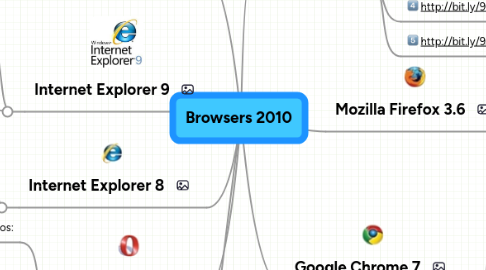
1. Definition of Browser
1.1. A software application for retrieving, presenting, and traversing information resources on the World Wide Web.
2. Internet Explorer 9
2.1. Pros:
2.1.1. Has some of the best HTML5 support
2.1.2. Renders pages extremely fast
2.2. Cons:
2.2.1. Does not run on Windows XP
2.2.2. Requires fairly new GPU
3. Internet Explorer 8
3.1. Pros
3.1.1. Renders old, poorly written webpages using "quirks" mode
3.2. Cons:
3.2.1. Renders pages very slowly
3.2.2. Little support for modern features
4. Opera 10.63
4.1. Pros:
4.1.1. Support for Mouse Gestures
4.1.2. Native text-to-speech
4.2. Cons:
4.2.1. Interface is not pretty
4.2.2. Menus can be hard to use
5. Apple Safari 5
5.1. Pros:
5.1.1. Browser used for the iPhone
5.1.2. Beta version has even better HTML5 support than Chrome
5.2. Cons:
5.2.1. Has worst HTML5 support among all browsers
5.2.2. Least secure browser
6. Sources
6.1. All sources are from October/Nov 2010
6.2. http://bit.ly/9xAsV6
6.3. http://bit.ly/bDwQsS
6.4. http://bit.ly/9msyms
6.5. http://bit.ly/9QU9dx
6.6. http://bit.ly/9JJcCs
7. Mozilla Firefox 3.6
7.1. Pros:
7.1.1. Supports many different web standards
7.1.2. Open-source with wide support for plug-ins
7.2. Cons:
7.2.1. Will use up a lot of memory when many plug-ins are running
7.2.2. Cluttered interface
8. Google Chrome 7
8.1. Pros:
8.1.1. Best HTML5 support among stable browsers
8.1.2. When a web page crashes, the browser will stay running
8.2. Cons:
8.2.1. Privacy may be a concern for some, as it is run by Google
8.2.2. Does not have as many extensions as Firefox
